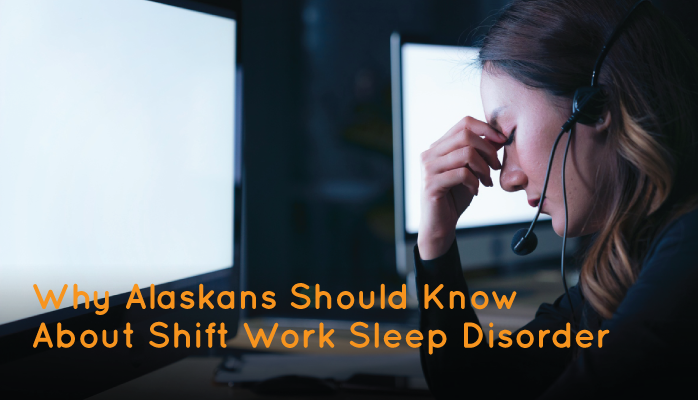Shift Work Sleeping Overview
Shift work sleeping disorder is a circadian rhythm disorder that causes sleep deprivation as a result of doing shift work. It's not uncommon for people to experience sleep problems when they work work irregular, long, or night shifts. When this happens, it is called shift work sleep disorder.
Not everyone who works outside of the typical M-F, 9-5 shift develops this disorder, but it should especially be considered for people living Alaska, given the relatively high number of shift work occupations here.
Alaskan Shift Work Occupations Are Common
Shift workers fulfill any of the following requirements:
- Work a non-normal daytime shift, such as outside the 7ish-6ish time
- Work in large chunks of on-off time
- Work non-consistent hours, such as rotating shift-work
Alaska is particularly ripe with shift work because of our two distinct seasons, extreme lighting conditions, and infrastructure. Common shift working occupations in Alaska includes:
- Pilots
- Construction workers
- Fishing industry workers
- Oil and gas workers on the slope
- Deputies in rural Alaska
Other shift working occupations that are common everywhere include:
- Medical professionals
- Law enforcement
- Firefighters
- Retail
While shift work often pays better than non-shift work, it can come at the cost of healthy sleep, and shift workers should be especially diligent in building good sleep schedules.
Overview of Shift Work Sleep Disorder Symptoms
Shift work sleep disorder causes sleep deprivation, and the main symptoms of shift work sleep disorder are consistent with the symptoms of chronic sleep deprivation:
- Chronic fatigue
- Brain fog
- Insomnia
- Reduced performance in all areas of life
- Reduced ability to manage stress
- Lower pain threshold
- Chronic irritability or having a short empter
- Get sick more often than normal
Why Alaskans Should Know About Shift Work Sleep Disorder
Shift workers who experience shift work sleep disorder are at increased risk for a variety of chronic illnesses due to sleep deprivation, such as [National Sleep Foundation]:
- Heart disease
- Gastrointestinal diseases
- Ulcers
- Metabolic syndrome
- Addiction to painkillers (pain is significantly higher in people with chronic sleep deprivation)
There are also psychological concerns with shift work, such as:
- Low morale from impacted social life
- Risk of depressive mood syndromes
Shift workers are also more prone to developing other sleeping disorders such as:
- Circadian rhythm disorders
- Insomnia
Sleep deprivation comes with some major safety concerns in high risk industries such as fishing and aviation. This is because fatigue from sleep deprivation dramatically impacts decision making and reaction times. For example, driving home after a 24 hour shift poses similar safety issues as drunk driving.
How to Mitigate Shift Work Sleep Disorder
Improving or preventing shift work sleep disorder can be especially challenging, and it usually entails that you set hard boundaries with yourself and/or your employer:
- Try not to work a number of night shifts in a row
- Avoid frequently rotating shifts
- Try to avoid long commutes
- Ensure that you have a sleep room that is ideal for sleep: dark, quiet, and clean
- Try and get consistent exercise on non-shift days
- Set a bedtime that you adhere too religiously – try to keep same bedtime even on non-work days
- Have a consistent bedtime routine in the 30 minutes before bed every night
- Avoid oversleeping on non-work days
- Avoid excessive screen use before bed, especially on work days at it will delay sleep
- Avoid caffeine and alcohol before bed, as they can delay sleep
- Invest in a comfortable bed, sheets, and pillow
Having a sleep schedule and sleep routine is of particular importance, as are exercise and healthy diet/drinking habits. One of the major challenges in dealing with this disorder are:
- You have to work around your shift work schedule
- One of the primary side effects of this disorder are reduced discipline
For example, binge sleeping is a common problem for people who have this disorder. While it feels good temporarily, it actually tends to perpetuate the sleep deprivation cycle and does not combat sleep deprivation. Consistent, healthy sleep patterns are the best way to improve shift work sleep disorder.
If you are a shift worker in Alaska and are concerned you have SWD, please consult with one of our sleep specialists.


